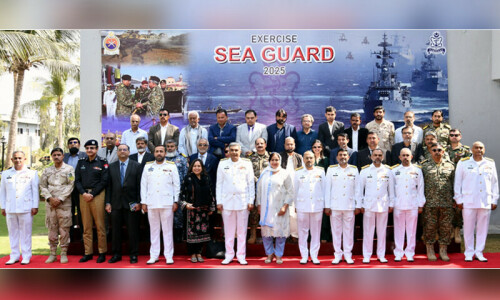Iran's Revolutionary Guard on Sunday claimed responsibility for a missile attack targeting an Iraqi base of a Kurdish separatist group.
Iranian state television aired footage of surface-to-surface missiles launching on Saturday toward the Democratic Party of Iranian Kurdistan base in Iraq, as well as drone footage of the base in the aftermath of the strike, which the separatists say killed at least 11 people and wounded 50.
The footage's release appeared to be a stark warning by the Guard to the separatist group, known by the acronym PDKI, which has resumed hit-and-run attacks in Iran after some two decades of uneasy peace.
A Kurdish attack in July killed at least 10 Iranian border guards, likely sparking the Guard's show of force.
“The Iranian armed forces won't allow terrorists to again threaten the country's national security,” the Guard said in a statement, warning that its future operations would be even “more crushing.”
Video aired by state television showed the short-range missiles being fired from mobile launchers in a field in an undisclosed location. The semi-official Tasnim news agency, believed to be close to the paramilitary Guard, identified the missiles fired as Fateh 110-Bs.
Those missiles are believed to have a range of up to 300 kilometres (185 miles), according to the Washington-based Center for Strategic and International Studies.
Tasnim said the missiles traveled some 220 kilometres (135 miles) to reach the base in Koya, in northern Iraq.
The Kurdish satellite news channel Rudaw reported that the secretary-general of the PDKI, Mustafa Mawludi, and his predecessor, Khalid Azizi, were wounded in the strike.
Also read: Kurdish women wage war on Daesh
The Iraqi Foreign Ministry on Sunday issued a statement criticising Iran's attack, saying it “rejects the violation of Iraqi sovereignty by bombing any target within Iraqi territory without prior coordination with the Iraqi authorities to spare civilians the effects of such operations.”
Iraq and Iran have close political and military ties, and Tehran provided extensive military support in the war against the Islamic State group.
Saturday's attack comes after the PDKI accused Iran on Friday of carrying out “indiscriminate shelling” targeting the border region.
Kurds represent about 10 per cent of Iran's population of 80 million people, with many living in the mountainous northwest that borders Iraq and Turkey.
A breakaway Kurdish republic backed by the Soviets briefly emerged after World War II and a Kurdish uprising followed in the years after Iran's 1979 Islamic Revolution. A guerrilla campaign by PDKI fighters in Iran continued into the mid-1990s.
The PDKI declared a unilateral cease-fire with Iran in 1996 after fighting in northern Iraq between warring Kurdish forces backed by Iraq and Iran.
Kurdish resentments have grown recently, buoyed by Kurdish control of areas in northern Iraq. The death of a Kurdish maid at a hotel in the northwestern city of Mahabad in May 2015 sparked unrest by local Kurds as opposition groups alleged Iranian security forces had a hand in it.
Since 2016, clashes have erupted between Kurdish fighters and Iranian security forces, including the Guard, leading to casualties on both sides. The PDKI, operating out of northern Iraq, claimed many of those attacks, which prompted Iranian forces to shell Kurdish positions just across the Iraqi border in response.
















































